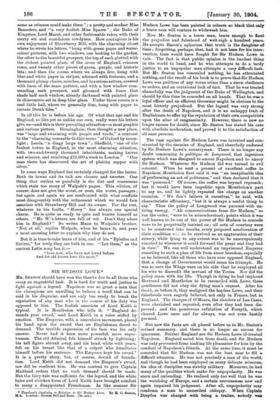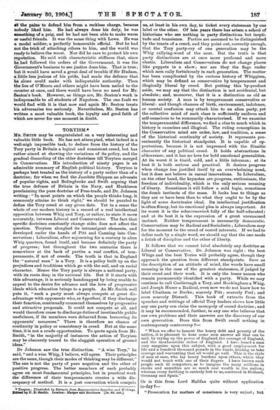SIR HUDSON LOWE.*
Mn. SEATON should have won the thanks due to all those who essay an ungrateful task. It is hard for truth and justice to fight against a legend. Napoleon was so great a man that his champions are unwilling to believe a word that can be said in his dispraise, and are only too ready to break the reputation of any man who in the course of his duty was opposed to him. The foolish anecdote of Lord Keith is typical. It is Montholon who tells it. "England de- mands your sword,' said Lord Keith in a voice stifled by emotion. The Emperor, with a convulsive movement, placed his hand upon the sword that an Englishman dared to demand. The terrible expression of his face was his only answer. Never had it been more powerful, more super- human. The old Admiral felt himself struck by lightning; his tall figure shrunk away, and his head, white with years, fell on his breast like that of a culprit who humiliates himself before his sentence. The Emperor kept his sword." It is a pretty story, but, of course, devoid of founda- tion. Lord Keith did not demand the Emperor's sword, nor did he confront him. He was content to give Captain Maitland orders that no such demand should be made. But the fairy-tale was sufficient for the legend, and the white hairs and stricken form of Lord Keith have brought comfort to many a disappointed Frenchman. In like manner Sir • Napoleon's Captivity is Relation to Sir Hudson Low. By B. C. Seaton, KA. London : Gem,' Bell end Bona. 155. nat.] Hudson Lowe has been painted in colours so black that-only a brave man will venture to whitewash him.
Now Mr. Seaton is a brave man, brave enough to lout the prejudice and falsehood of well-nigh a hundred years. He accepts Bacon's aphorism that truth is the daughter of time ; forgetting, perhaps, that, had it not been for his inter- vention, time would have fought for Sir Hudson Lowe in vain. The fact is that public opinion is the hardest thing in the world to bend, and he who attempts to do a tardy justice to an unpopular man attempts a very difficult task. But Mr. Seaton has concealed nothing, he has attenuated nothing, and the result of his book is to prove that Sir Hudson Lowe was guiltless of any worse crime than a stern obedience to orders, and an occasional lack of tact. That he was treated shamefully was the judgment of the Duke of Wellington, and should by this time be conceded on all hands. That he was a loyal officer and an efficient Governor might be obvious to the most bitterly prejudiced. But the legend was very strong after the death of Napoleon, and it is an unhappy trait of Englishmen to offer up the reputation of their own compatriots upon the altar of magnanimity. However, there is now no longer excuse for doubt, since Mr. Seaton has stated his case with absolute moderation, and proved it to the satisfaction of all sane persons.
The ease against Sir Hudson Lowe was invented and con- structed by the enemies of England, and cheerfully endorsed by Sir Hudson Lowe's countrymen. There is no longer any doubt concerning kt politigue de Longwood, that ingenious system which was designed to amuse Napoleon and to annoy Sir Hudson. Whatever Sir Hudson did was turned to evil account. When he sent a present of excellent coffee to Napoleon, Montholon first said it was "an inexplicable idea of performing an act of politeness," and then declared that it was "poisoned." Of course, the coffee was beyond reproach; but it would have been impolitic upon Montholon's part to say so, and he lightly repeated the charge on another occasion. "We don't believe it ourselves," he said, with characteristic effrontery, "but it is always a useful thing to say." Thus the policy of Longwood was pursued with un- tiring energy. "All communications from Sir Hudson," so ran the order, "were to be misunderstood; points which it was well known to be out of the power of Sir Hudson to concede were to be perpetually insisted on ; all acts of courtesy were to be construed into insults, every proposed amelioration of their condition waz, to be received as an aggravation of their misery, while lying to any extent was to be unscrupulously resorted to whenever it could forward the great end they had in view." We can well understand an imprisoned Emperor resorting to such a plan of life from sheer boredom, especially as he believed, like all those who have ever opposed England, that a change of Government would mean his triumph. He was so sure the Whigs were on his side that he employed all his wits to discredit the servant of the Tories. Nor did the policy cease with his life. Though in dying he had implored Bertrand and Montholon to be reconciled with Lowe, these gentlemen did not obey the dying man's request. After his death, as before it, they maligned the hapless Lowe, and their falsehoods were eagerly believed, not only in France, but in England. The charges of O'Meara, the slanders of Las Cases, were cherished and repeated, even after they had been dis- proved; and the ponderous refutation of Forsyth, which cleared Lowe once and for always, was not even hastily perused.
But now the facts are all placed before us in Mr. Seatcm's revised summary, and there is no longer an excuse for ignorance. Neither England nor Sir Hudson Lowe ill-treated Napoleon. England saved him from death, and Sir Hudson was only prevented from making life pleasanter for him by the conduct of Napoleon's friends. At the same time, it must be conceded that Sir Hudson was not the best man to fill a difficult situation. He was not precisely a man of the world, and though he had been employed on many delicate missions, his idea of discipline was strictly military. Moreover, he had many of the qualities which make for unpopularity. He was stern and unbending. He realised only too well that he was the watchdog of Europe, and a certain nervousness now and again impaired his judgment. After all, unpopularity may condemn a man to unmerited obloquy. When Captain Dreyfus was charged with being a traitor, nobody wan t' the pains to defend him from a reckless charge, because nobody liked him. He had always done his duty, he was something of a prig, and he had not been able to make warm or useful friends. It was the same thing with Lowe. He was a model soldier, a perfectly honourable official. But he had not the trick of attaching others to him, and the world was ready to believe the worst. Nor did he care to protect his own reputation. He said with characteristic stiffness that, since he had followed the orders of the Government, it was the Government's business to see justice done him. That is true ; but it would have saved a great deal of trouble if Sir Hudson, a little less jealous of his pride, had made the defence that he alone could make with indisputable authority. Then tie lies of O'Meara and others might have been nailed to the counter at once, and there would have been no need for Mr. Seaton's book. However, as things are, Mr. Seaton's work is indispensable to all students of Napoleon. The one fault we would find with it is that now and again Mr. Seaton treats his adversaries too seriously. Nevertheless, Mr. Seaton has written a most valuable book, the loyalty and good faith of which are never for one moment in doubt.























































 Previous page
Previous page